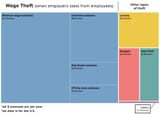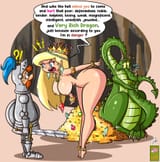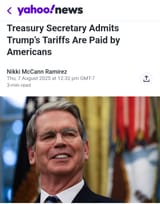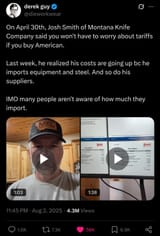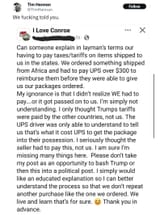>>512488547Maintain a position in the market while profits decline.
It depends on the product, but here is an example
>foreign headphones cost 10 bucks but 8 bucks is profit>domestic headphones cost 25 bucks but 5 bucks is profit>most people just buy the cheapies because there is a large price difference>100% tariff>price difference is much smaller, but foreign goods are still cheaper even with tariff>regardless, consumers are more open to paying an extra 5 bucks for perceived quality/patriotism whatever than they are 15 bucks>sales decline>a new price equilibrium is sought>by lowering the price (and the tariff), they can sell more units, even if the profit is lower>rather than passing off the full tariff to fewer consumers, they can eat part of the tariff to reach a broader market, resulting in more profit than passing 100% of the tariff.So say they were selling 1000 units at 8 dollars profit before, making 8000 profit.
If they pass 100% of the tariff off, perhaps they only sell 500 units for 4000 profit.
If they lower the price 2 dollars to 8, the cost to a consumer is now 16 dollars (vs 25 domestic) at 6 dollars profit
perhaps they sell 700 units, making 4200.
By lowering the cost, they increase their profit over passing Theo whole tariff off.
This exchange can happen multiple times in the supply chain. This importer may eat a little, the distributor may eat a little, the wholesaler may eat a little, the retailer may eat a little.
Because, this it’s important, their goal is not the highest sale price, or profit per unit, it is total profit. If moving more units at a cheaper price increases profits, they will do that.
There are some confounders in foolish greed and stupid consumers, for example Walmart raising the price on goods substantially, even if they were made in America or had no tariffs, or the tariffs were significantly smaller than the price increase.
But if people won’t buy them, they will adapt.










